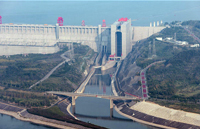Typhoons leave eastern coastline battered
By SHI XIAOFENG in Hangzhou and ZHENG JINRAN in Beijing (China Daily) Updated: 2016-09-19 09:43
 |
|
Typhoon Malakas, the 16th of the year, affected the eastern coast in Wenling, Zhejiang province, on Sunday. People were warned to stay away.[Photo by JIN YUNGUO/FOR CHINA DAILY] |
Following the stormy Mid-Autumn Festival, residents in China's eastern coastal regions witnessed a severe typhoon on Sunday that brought high tides, heavy rain and wind gusts that battered the coastline and caused heavy damage.
Typhoon Malakas, the 16th major storm of the season, followed Typhoon Meranti, which was the world's strongest typhoon of the year. And East China's Zhejiang province bore the brunt. The storm began to weaken in the East China Sea as it turned northeastward on Sunday afternoon, the China Meteorological Observatory said.
Qiantang River's renowned annual tidal bore, which is caused by the gravitational pull of the moon during autumn, has been driven higher due to the typhoons, reaching 2.1 meters on Sunday afternoon in Haining city, Zhejiang province. That is 0.5 meters higher than forecast, said Xing Yun, head of the information department of the river's administration bureau.
"Affected by the recent typhoons, the waves have grown stronger, so visitors should keep their distance to avoid potential risks," Xing said, adding that visitors flock to the province for the sight of the world's largest waves.
Shanghai also warned that gales brought by the typhoon would affect the city's metro system on Sunday and Mon-day.
Vast areas along the eastern coastline, especially in Fujian and Zhejiang provinces, were battered by Typhoon Meranti starting on Wednesday last week.
Meranti made landfall in Xiamen, Fujian province, on Thursday, with gales and downpours causing 28 deaths and leaving another 15 people missing in Zhejiang and Fujian as of Saturday morning, according to provincial governments.
In Xiamen, 620,000 house-holds suffered power outages, while more than 90 percent of the city's urban vegetation was damaged, Xinhua News Agency report-ed on Sunday.
As of Sunday, 70 percent of the power grid was said to be back to normal.
Wang Weijun, deputy head of Xiamen Bureau of Parks and Woods, said that felled trees had been disrupting traffic.
"It will take about three days to clean up this mess," Wang said.
The city government announced that primary schools and kindergartens, including private schools, would be closed for two or three days, as power supply and transportation networks have both been affected.
Xiamen's famous resort island, Gulangyu, has been closed since Friday. All ferry trips between the island and the port in Xiamen have been canceled.
- Li arrives in NY for high-level discussions at UN
- China's State Council officials pledge allegiance to the Constitution
- China issues plan for Beijing tech innovation hub
- Li to address UN General Assembly, visit Canada, Cuba
- Typhoon Meranti death toll rises to 28
- Beijing consumers spend big on Moon festival
- Using the 'fan economy' to build franchises
- Employed, hale and hearty
- US researchers: Filial piety helps solve eldercare woes in China
- Astronauts given comfort upgrade on China's new space lab










